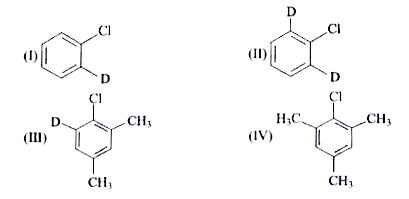Which of the following compounds undergoes
nucleophilic substitution most readly?




The correct Answer is:B
To determine which of the given compounds undergoes nucleophilic substitution most readily, we need to analyze the factors that influence the reactivity of aromatic compounds in nucleophilic substitution reactions.
1. Identify the Compounds:
We need to identify the compounds provided in the question. Let's assume we have four benzene derivatives with different substituents.
2. Understand the Leaving Group:
In nucleophilic substitution reactions, the leaving group plays a crucial role. A good leaving group is one that can stabilize the negative charge after it departs. In this case, all compounds have Cl as the leaving group, which is a good leaving group.
3. Evaluate the Substituents:
The reactivity of the aromatic compound in nucleophilic substitution is influenced by the substituents present on the benzene ring. We need to analyze the electronic effects of the substituents:
- Electron-Withdrawing Groups (EWGs): These groups (like -NO2) stabilize the negative charge that develops during the reaction and enhance reactivity.
- Electron-Donating Groups (EDGs): These groups (like -CH3 or -OCH3) destabilize the negative charge and decrease reactivity.
4. Analyze the Position of Substituents:
The position of the substituents (ortho or para) relative to the leaving group (Cl) is also important. Substituents at the ortho or para positions can significantly affect the reactivity:
- A strong EWG at the para position (like -NO2) will increase the reactivity of the compound.
- EDGs at the ortho or para positions will decrease the reactivity.
5. Compare the Compounds:
- If one compound has a -NO2 group at the para position relative to Cl, it will enhance the nucleophilic substitution reaction due to its strong electron-withdrawing nature.
- In contrast, if other compounds have EDGs like -CH3 or -OCH3, they will decrease the rate of nucleophilic substitution.
6. Conclusion:
Based on the analysis, the compound with the -NO2 group at the para position will undergo nucleophilic substitution most readily due to its strong electron-withdrawing effect.
Final Answer:
The compound that undergoes nucleophilic substitution most readily is the one with the -NO2 substituent at the para position.
We need to identify the compounds provided in the question. Let's assume we have four benzene derivatives with different substituents.
In nucleophilic substitution reactions, the leaving group plays a crucial role. A good leaving group is one that can stabilize the negative charge after it departs. In this case, all compounds have Cl as the leaving group, which is a good leaving group.
The reactivity of the aromatic compound in nucleophilic substitution is influenced by the substituents present on the benzene ring. We need to analyze the electronic effects of the substituents:
- Electron-Withdrawing Groups (EWGs): These groups (like -NO2) stabilize the negative charge that develops during the reaction and enhance reactivity.
- Electron-Donating Groups (EDGs): These groups (like -CH3 or -OCH3) destabilize the negative charge and decrease reactivity.
The position of the substituents (ortho or para) relative to the leaving group (Cl) is also important. Substituents at the ortho or para positions can significantly affect the reactivity:
- A strong EWG at the para position (like -NO2) will increase the reactivity of the compound.
- EDGs at the ortho or para positions will decrease the reactivity.
- If one compound has a -NO2 group at the para position relative to Cl, it will enhance the nucleophilic substitution reaction due to its strong electron-withdrawing nature.
- In contrast, if other compounds have EDGs like -CH3 or -OCH3, they will decrease the rate of nucleophilic substitution.
Based on the analysis, the compound with the -NO2 group at the para position will undergo nucleophilic substitution most readily due to its strong electron-withdrawing effect.
The compound that undergoes nucleophilic substitution most readily is the one with the -NO2 substituent at the para position.
Similar Questions
Knowledge Check
- Question 1 - Select One
Which of the following will not undergo nucleophilic aromatic substitution ?
 AI, II and IIIBII and IVVCIII and IVDonly IV
AI, II and IIIBII and IVVCIII and IVDonly IV
Which of the following undergoes nucleophilic substitution exclusively by SN1 mechanism?
View SolutionWhich of the following undergoes nucleophilic substitution exclusively by SN1 mechanism?
View SolutionOutline the preparation of the following compounds using a nucleophilic substitution reaction : CH3C≡CCH2CH3
View SolutionOutline the preparation of the following compounds using a nucleophilic substitution reaction : CH3CH2−O−N=O
View SolutionOutline the preparation of the following compounds using a nucleophilic substitution reaction : C6H5CH2OCOCH3.
View SolutionOutline the preparation of the following compounds using a nucleophilic substitution reaction : C6H5CH2N=C
View SolutionOutline the preparation of the following compounds using a nucleophilic substitution reaction : CH3CH2CH2CN
View Solution


